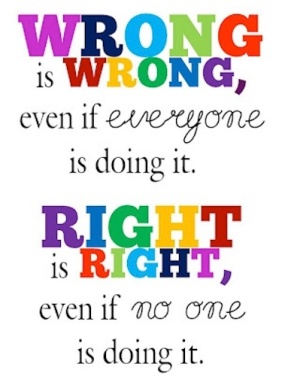How Our Minds Justify Actions
When someone wants to justify their actions they can get pretty creative with the rationale, excuse making or blaming. The bottom line is that if any of us wants to justify our actions, we can twist our thinking into making it so.
Let’s all remember that we don’t have to justify actions when we do the right thing – only when we do the wrong thing. And wrong is wrong no matter how we justify our actions.
Life’s just a whole lot easier when we Quit Trying To Make Wrong Right. (Kurt Smith)
They are not protecting the people involved, because when push comes to shove they won’t give a dollar to help them and they won’t show up in court for support, but they will justify the actions, only because they are guilty in someway or another of a similar crime (or they may have family or friends that are involved in these crimes).
It’s not for nothing that someone sympathizes with bad and criminal individuals or groups.
Anybody you hear justify and excuse bad and criminal behavior, ask them, what illegal activity are you involved in?

September 14, 2014 at 8:20 pm |
“Right or wrong, you’re passionate. You care.” If that doesn’t sum up current liberal attitudes in the face of facts, I don’t know what does. Caring means more to them than actually knowing the difference between something that’s false and something that’s true.
September 14, 2014 at 8:22 pm |
Every time I see people trying to justify and excuse bad people, I’m reminded of the following story:
On May 7, 1931, the most sensational manhunt New York City had ever known had come to it’s climex.
After weeks of search, “Two Gun” Crowley—the killer, the gunman who didn’t smoke or drink—was at
bay, trapped in his sweetheart’s apartment on West End Avenue.
One hundred and fifty policemen and detectives laid siege to his top-floor hideaway. They chopped holes in the roof; they tried to smoke out Crowley, the “cop killer,” with tear gas. Then they mounted their machine guns on the surrounding buildings, and for more then an hour one New York’s fine residential areas reverberated with the crack of pistol fire and the rat- tat-tat of machine guns. Crowley, crouching behind an overstuffed chair, fired incessantly at the police. Ten thousand excited people watched the battle. Nothing like it had ever been seen before on the sidewalks of New York.
When Crowley was captured, Police Commissioner E.P. Mulroney declared that the two-gun desperado was one of the most dangerous criminals ever encountered in the history of New York. “He will kill,” said The Commissioner, “at the drop of a feather.”
But how did “Two Gun” Crowley regard himself?
We know, because while the police were firing into his apartment, he wrote a letter addressed “To whom it may concern.” And, as he wrote, the blood flowing from his wounds left a crimson trail on the paper. In his letter Crowley said:
“Under my coat is a weary heart, but a kind one—-one that would do nobody any harm.”
A short time before this, Crowley had been having a necking party with his girl friend on a country road out on Long Island. Suddenly a policeman walked up to the car and said: “Let me see your license.
Without saying a word, Crowley drew his gun and cut the policeman down with a shower of lead. As the dying officer fell, Crowley leaped out of the car, grabbed the officer’s revolver, and fired another bullet into the prostrate body. And that was the killer who said:
“Under my coat is a weary heart, but a kind one– –one that would do nobody any harm.”
Crowlet was sentenced to the electric chair. When he arrived at the death house in Sing Sing, did he say, “This is what I get for killing people”? NO, he said: “This is what I get for defending myself.”
The point of the story is this: “Two Gun” Crowley
Didn’t blame himself for anything. That is the usual attitude amongst criminals!!!